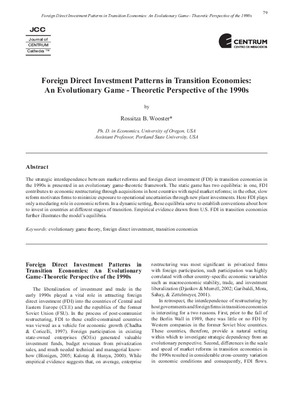| dc.contributor.author | Wooster, Rossitza B. | |
| dc.date.accessioned | 2023-07-21T19:18:09Z | |
| dc.date.available | 2023-07-21T19:18:09Z | |
| dc.date.issued | 2009 | |
| dc.identifier.uri | https://repositorio.pucp.edu.pe/index/handle/123456789/194765 | |
| dc.description.abstract | The strategic interdependence between market reforms and foreign direct investment (FDI) in transition economies in the 1990s is presented in an evolutionary game-theoretic framework. The static game has two equilibria: in one, FDI contributes to economic restructuring through acquisitions in host countries with rapid market reforms; in the other, slow reform motivates firms to minimize exposure to operational uncertainties through new plant investments. Here FDI plays only a mediating role in economic reform. In a dynamic setting, these equilibria serve to establish conventions about how to invest in countries at different stages of transition. Empirical evidence drawn from U.S. FDI in transition economies further illustrates the model’s equilibria. | en_US |
| dc.language.iso | eng | |
| dc.publisher | Pontificia Universidad Católica del Perú. CENTRUM | |
| dc.relation.ispartof | urn:issn:1851-6599 | |
| dc.rights | info:eu-repo/semantics/openAccess | es_ES |
| dc.rights.uri | http://creativecommons.org/licenses/by/4.0 | * |
| dc.source | Journal of CENTRUM Cathedra, Vol. 2, Issue 2 | |
| dc.subject | Evolutionary game theory | en_US |
| dc.subject | Foreign direct investment | en_US |
| dc.subject | Transition economies | en_US |
| dc.title | Foreign Direct Investment Patterns in Transition Economies: An Evolutionary Game - Theoretic Perspective of the 1990s | en_US |
| dc.type | info:eu-repo/semantics/article | |
| dc.type.other | Artículo | |
| dc.subject.ocde | https://purl.org/pe-repo/ocde/ford#5.02.04 | |
| dc.publisher.country | PE | |


